Vizită la Polul Nord (II)
|
S-a spus despre prezenta noastra aici, la pelerinajul polar, ca trebuie facuta cu umilinta. Rostul acestui pelerinaj din Oceanul Arctic este de a reuni lideri religiosi din intreaga lume pentru a se ruga si a deschide ochii lumii asupra pericolului dezgheturilor polare. In aceasta prima zi a avut loc o „Rugaciune in tacere“ care a reunit catolici, ortodocsi si protestanti, alaturi de musulmani Shia, Sunni, Wahabi si Ismaili, evrei, budisti, hindusi, taoisti, Shinto, precum si Inuit si Saami, reprezentand credinta din cercul Arctic. Cate un copil de pe fiecare continent a participat in ceremonia rugaciunii, ca un simbol al faptului ca viitorul lor este in joc.
In ultima zi a simpozionului, o slujba bizantina va fi oficiata de Sanctitatea Sa Patriarhul ecumenic la biserica din Tjodhilde, construita de vikingii crestini inainte de schisma din anul 1000. Este prima biserica ridicata in afara Europei catre vest si este, prin intermediul vikingilor, legata de Imperiul Bizantin, Constantinopole si traditia crestina timpurie. La 30 noiembrie anul trecut, Papa Benedict XVI si Patriarhul ecumenic Bartolomeu I au semnat la Fanar o declaratie comuna:
De altfel, „oekoumeni“, in limba greaca inseamna intreaga lume locuita. Simpozionul are ca motto o reflexie a sfantului Maxim Confesorul, calugar si teolog nascut in anul 580 e.n. si mort in anul 662 e.n.: „S-a vazut bine ca noi nu ar trebui sa luptam impotriva lumii naturale, care este creata de Dumnezeu, ci impotriva miscarilor si energiilor puterilor esentiale din noi care sunt dezordonate, ne-naturale si ostile lumii naturale“. Datorita fragilitatii ecosistemelor, ambele Poluri trag un semnal de alarma, fiindca in zona Polurilor Nord si Sud se vad consecintele dezastrelor pe care omenirea le-a produs in zona tropicala si temperata. In Nord, insa, marea inghetata este foarte fragila, explorarile petroliere au pace si encroachment din afara, si nu exista un tratat international care sa protejeze si sa ofere o masura de protectie pentru Antarctica in sud.
77% din apa proaspata al lumii este inchisa in gheata polara, iar in ultimii zece ani apa care a curs in Oceanul Arctic a crescut dramatic. Daca apa in marile lumii va creste cu sapte metri, aceasta va avea consecinte devastatoare in Bangladesh, Egipt, Vietnam, Olanda si o parte din Statele Unite. Shanghai si New York ar suferi efecte dincolo de imaginatie. Pelerinajul polar ar trebui sa fie insotit in suflet de toti cei carora le pasa de viitorul omenirii si de relatia ei cu planeta. „Ca sa schimbam ceea ce vedem, noi trebuie sa schimbam felul in care vedem“. Aseara m-am intalnit cu dna Massoumeth Ebtekar, profesor de imunologie la universitatea din Teheran, a fost prima femeie vice-presedinte a Republicii Islamice a Iranului. De asemenea, am discutat cu profesorul Jinwol Young Ho Lee, calugar budist si decan al catedrei de studii Seon si director al Institutului de Cultura Budista si Afaceri Sociale din Gyeongju, capitala veche de o mie de ani a Coreei (Silla).
La eveniment participa oameni de stiinta de prima marime, specialisti in oceanul Arctic. Dupa „Rugaciunea in tacere“, prima zi a simpozionului a continuat cu prima intalnire in plen, impartita pe doua teme de analiza: „Povestea Groenlandei“, semnificatia ei in mediul inconjurator global, adaptare si supravietuire si „O planeta suferinda“, biosfera, ce se intampla Pamantului si de ce. Au luat cuvantul Patriarhul Bartolomeu, primarul orasului Ilulissat, profesorul Minik Rosing, geolog din Danemarca, Aqqaluk Lynge, politician si scriitor groenlandez, Svend Auken, ministrul Mediului din Groenlanda, Eminenta Sa Mitropolitul Ion de Pergamon, Dr. Antonio Nobre, profesorul Victor Gorshkov si profesoara Anastassia Makarieva, profesori de fizica nucleara la Sankt Petersburg. |

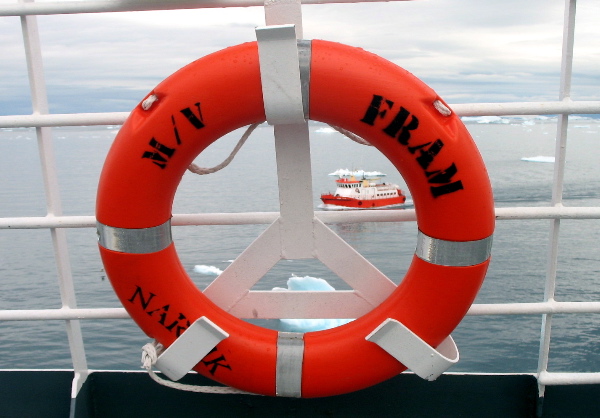
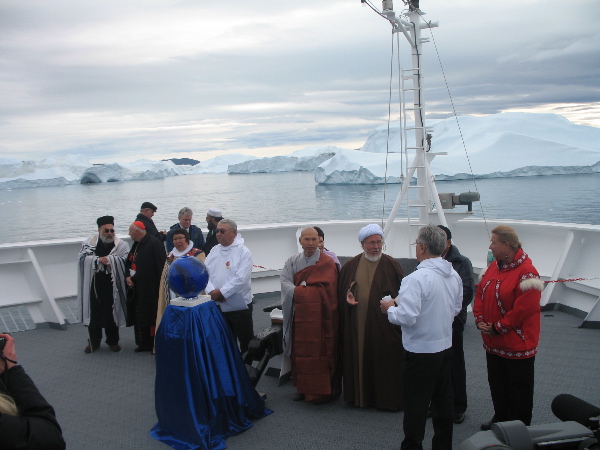
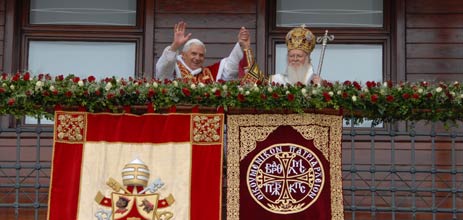
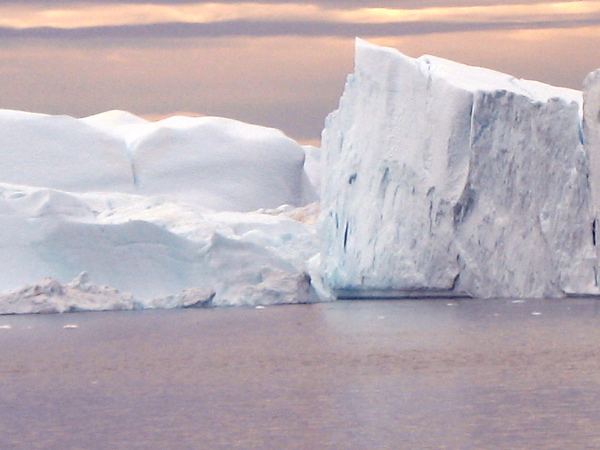
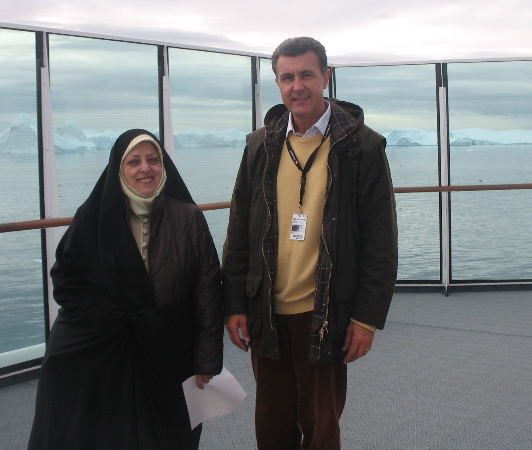
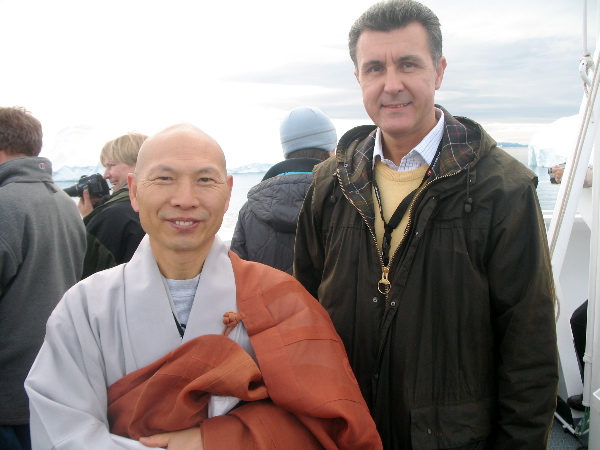




Symposium VII: ‘The Arctic: Mirror of Life’
under the patronage of
HAH The Ecumenical Patriarch Bartholomew
HE Mr José Manuel Barroso, President of the European Commission
HE Mr Kofi Annan, Former Secretary-General of the United Nations
6th – 12th September 2007
RELIGION, SCIENCE AND THE ENVIRONMENT
The full Arctic dossier can be downloaded here.
(Please be patient as it is a large document and may take some time to download)
“It has been well observed that we should wage war not against the natural world, which has been created by God, but against those movements and energies of the essential powers within us which are disordered and unnatural and hostile to the natural world”.
St Maximus the Confessor, Monk and theologian, 580 – 662AD
From the Amazon to the Arctic
Since 1995, the non-profit organisation Religion, Science & the Environment has convened six symposia to study the fate of the world’s main bodies of water – the sacred element for most religions – which cover seven-tenths of the earth’s surface. Participants come from diverse backgrounds and disciplines, including religious leaders, scientists, policy-makers, environmentalists, activists, local community leaders, and the media. These unique global gatherings have promoted the environmental ethics movement through an alliance between science and religion forged in a spirit of mutual respect and cooperation.
The most recent symposium, Amazon: Source of Life, travelled through the world’s most magnificent system of rivers. It reaffirmed many of the lessons learned in previous years, while engaging with the ancient wisdom of the indigenous people for whom these waters have always been sacred.
In what is also the world’s largest forested area, this 6th symposium took RSE onto new ground, focusing attention on the critical ecological roles played by the Amazon’s 42 billion trees and the risk inherent in their systematic destruction. The impact on the regional hydrological cycle will soon threaten the water supply to Brazil’s largest cities. As the source of two thirds of all greenhouse gas emissions from Brazil, the cutting and burning of rainforest also contributes significantly to global warming.
Even before the journey to Brazil, Ecumenical Patriarch Bartholomew had made a strong statement on climate change. As scientists reached a consensus, he said, it was no longer just an issue of environmental preservation but “insofar as it is human-induced, it is a profoundly moral and spiritual problem”. The evidence of human actions is painfully clear worldwide: low-lying islands in the Pacific are already underwater; hurricanes of magnifying intensity and frequency are wreaking havoc along the US coast; the number of food emergencies in Africa each year has almost tripled since the 1980s as a result of drought and desertification. Nowhere do the effects of this moral problem more cruelly manifest themselves than in the Arctic, a starkly truthful mirror of our own failings.
Symposium VII – The Arctic: Mirror of Life
Recognising this to be a pivotal moment in human history, Symposium VII will take place in the Arctic Ocean in September 2007. Contrasting the colourful exuberance of the Brazilian rainforest with the silent majesty of the Arctic, our journey will be a polar pilgrimage conducted in awe and humility.
Given the sensitivity of their ecosystems, both poles have been called an early-warning system for the world, because that is where the environmental sins we perpetrate in the tropical and temperate zones impact most severely. But in the North, there are indigenous populations which have already suffered tremendous upheavals, the sea-ice is particularly fragile, oil exploration has brought pace and purpose to encroachments from the outside, and there is still no international treaty to offer the enforceable protections that provide a measure of shelter to Antarctica in the south.
If the Arctic is one of the first victims of human-induced climate change, however, it is by no means a passive one. The vast stores of water locked, until now, into the rapidly melting Arctic Ocean sea-ice and the Greenland ice-cap have the power to unleash a ferocious vengeance on the rest of the world. About 77% of the earth’s freshwater is locked in as polar ice. In the last ten years, the amount of fresh water flowing into the Arctic Ocean has increased dramatically. Scientists fear this will reduce its salinity, causing the Gulf Stream to falter and possibly plunging Europe into a mini Ice Age. A rise in sea temperatures of just 2.7°C could start an irreversible process that would eventually raise global sea levels by 7 metres, with devastating consequences for low-lying small island states and countries like Bangladesh, Egypt, Vietnam, the Netherlands, and parts of the United States. Many major cities, from New York to Shanghai, would be overwhelmed with knock-on effects beyond imagining.
In the Arctic regions, large amounts of methane – a particularly potent greenhouse gas – and carbon dioxide, trapped for centuries in the permafrost, will be released, accelerating the warming process. Permafrost, which covers 27% of the world’s land surface, is already starting to melt, particularly in Siberia, Alaska and Canada.
We know about tipping points, yet we ignore the warnings written large across the cap of the world. It is our nemesis that bubbles up from the melting permafrost in methane release. It is our whole planet that is at risk from the melting Greenland Glacier. It is our future that is threatened by the loss of the precious reflective whiteness of the Arctic ice. The planet is in crisis and each of us has a moral obligation to take urgent action.
To underline this, the symposium will visit areas where the impacts of melting ice are already clear, the northernmost communities in the world who have shown extraordinary resilience in the face of change, and finally the towering edge of the ice mass, still vast but retreating year on year towards the Pole. There, the assembled leaders of different faiths and disciplines will join in a prayer for the planet.
Few people now doubt the science of climate change, but this prayer from the top of the world will offer a different message: that the polar pilgrimage should be joined in spirit by all those who care about the future of mankind and its relationship with the planet, be they in Manaus or Moscow, Borneo or Beijing, Innsbruck or Ottawa.
Bucureşti, 7 sep /Rompres/ – Principele Radu de Hohenzollern-Veringen, reprezentant special al Guvernului României, participă, în perioada 5-13 septembrie 2007, la Polul Nord, la simpozionul ‘Oceanul Arctic: oglinda vieţii’, invitat de Patriarhul ecumenic al Constantinopolului, Bartolomeu I.
Pelerinajul are ca scop reunirea de lideri religioşi din întreaga lume, pentru a se ruga şi a trage un semnal de alarmă asupra pericolului dezgheţului calotei polare.
Simpozionul are ca motto o reflexie a sfântului Maxim Confesorul, călugar şi teolog( 580-662) : ‘S-a văzut bine că noi nu ar trebui să luptăm împotriva lumii naturale, care este creată de Dumnezeu, ci împotriva mişcărilor şi energiilor puterilor esenţiale din noi care sunt dezordonate, nenaturale şi ostile lumii naturale’.
În cadrul acestui pelerinaj, Patriarhul Bartolomeu va face o rugăciune în tăcere şi va oficia o slujbă bizantină la biserica din Tjodhilde, construită de vikingii creştini înainte de marea schismă din anul 1054.
La eveniment participă renumiţi oameni de ştiinţă, specialişti în Oceanul Arctic.
În cadrul dezbaterilor vor lua cuvântul Patriarhul ecumenic al Constantinopolului, primarul oraşului Ilulissat, profesorul Minik Rosing, geolog din Danemarca, Aqqaluk Lynge, politician şi scriitor groenlandez, Sven Auken, ministrul Mediului din Groenlanda, mitropolitul Ion de Pergamon, dr. Antonio Nobre, profesorul Victor Gorşkov, prof. Anastassia Makarieva, profesori de fizică nucleară la Sankt Petersburg.
De mai bine de 12 ani, Patriarhul ecumenic patronează simpozioane dedicate ştiinţei, mediului înconjurător şi religiei, invitând personalităţi de talie mondială să participe la croaziere pe apele lumii aflate în pericol ecologic.ROMPRES/(AS)
How wonderful – we cannot wait to hear all about the trip when you are back. What a fantastic experience! Warmest regards, Anne-Marie & Neil
necunoscute si demne de tot respectul sunt aceste preocupariextrem de actuale ale altetei sale ,principele Radu.curaj,mergeti mai departe,acesta este tipul de ambasador pe care ni l-am dori in toata lumea .sanatate mariei sale regelui Mihai l
Doamne, asculta ruga noastra a tuturor, ajuta-ne sa ajutam,sa ocrotim,sa reusim impreuna sa ne salvam,sa pastram pace, sa comunicam armonios,sa traim in iubire, sa respectam natura si intreg Universul.
Great add. Its a pleasure to read this article because for 13 years of international peace organization representative its everything i done or do. Asia, Africa, Europe participant. This global alliance of religious, academic, political, ONG leaders and organizations joined together to promote peace through education, economic, culture, sports, art, media, interreligious cooperation, partnership among governments, religions, diplomatic and science world. United Nations renewal. Etc. Nice ev.